Book6U1教案3Wordpower
- 格式:doc
- 大小:25.50 KB
- 文档页数:3
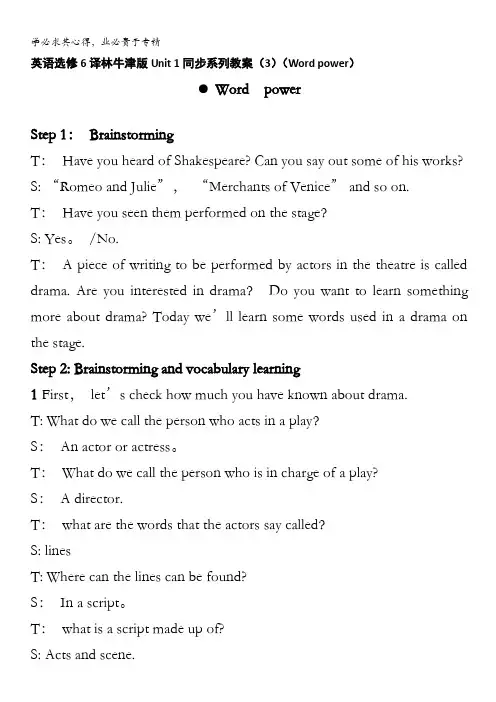
英语选修6译林牛津版Unit 1同步系列教案(3)(Word power)●Word powerStep 1:BrainstormingT:Have you heard of Shakespeare? Can you say out some of his works? S: “Romeo and Julie”,“Merchants of Venice” and so on.T:Have you seen them performed on the stage?S: Yes。
/No.T:A piece of writing to be performed by actors in the theatre is called drama. Are you interested in drama?Do you want to learn something more about drama? Today we’ll learn some words used in a drama on the stage.Step 2: Brainstorming and vocabulary learning1 First,let’s check how much you have known about drama.T: What do we call the person who acts in a play?S:An actor or actress。
T:What do we call the person who is in charge of a play?S:A director.T:what are the words that the actors say called?S: linesT: Where can the lines can be found?S:In a script。
T:what is a script made up of?S: Acts and scene.T: What are the words called that tell the actors how to act?S:They are called stage directions。
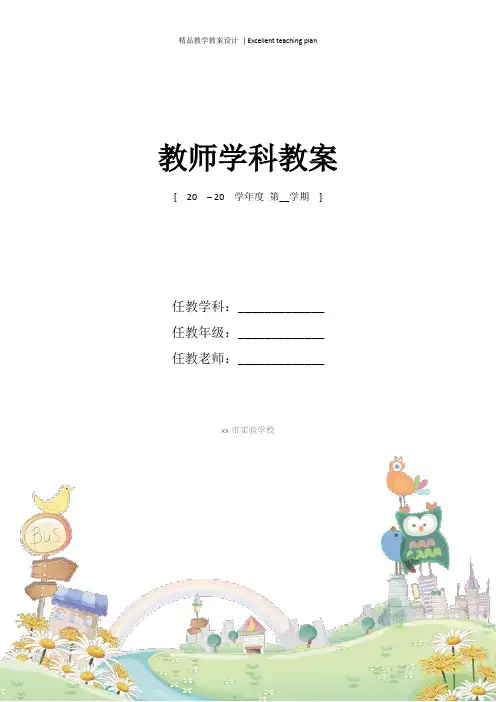
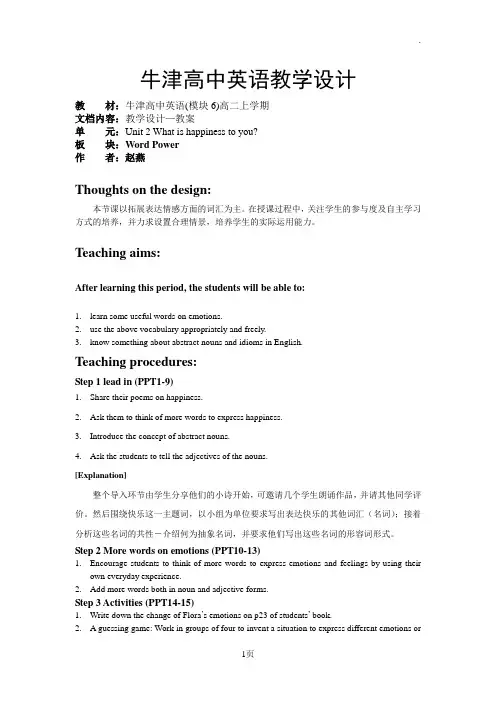
牛津高中英语教学设计教材:牛津高中英语(模块6)高二上学期文档内容:教学设计—教案单元:Unit 2 What is happiness to you?板块:Word Power作者:赵燕Thoughts on the design:本节课以拓展表达情感方面的词汇为主。
在授课过程中,关注学生的参与度及自主学习方式的培养,并力求设置合理情景,培养学生的实际运用能力。
Teaching aims:After learning this period, the students will be able to:1.learn some useful words on emotions.e the above vocabulary appropriately and freely.3.know something about abstract nouns and idioms in English.Teaching procedures:Step 1 lead in (PPT1-9)1.Share their poems on happiness.2.Ask them to think of more words to express happiness.3.Introduce the concept of abstract nouns.4.Ask the students to tell the adjectives of the nouns.[Explanation]整个导入环节由学生分享他们的小诗开始,可邀请几个学生朗诵作品,并请其他同学评价。
然后围绕快乐这一主题词,以小组为单位要求写出表达快乐的其他词汇(名词);接着分析这些名词的共性-介绍何为抽象名词,并要求他们写出这些名词的形容词形式。
Step 2 More words on emotions (PPT10-13)1.Encourage students to think of more words to express emotions and feelings by using theirown everyday experience.2.Add more words both in noun and adjective forms.Step 3 Activities (PPT14-15)1.Write down the change of Flora’s emotions on p23 of students’ book.2. A guessing game: Work in groups of four to invent a situation to express different emotions orfeelings. Speak in front of the audience and ask them to guess the words. [Explanation]此环节可采取“头脑风暴”鼓励学生说出更多的与情感相关的词汇,并且要求是在情景中描绘,接着扩充更多词汇要求学生记忆。
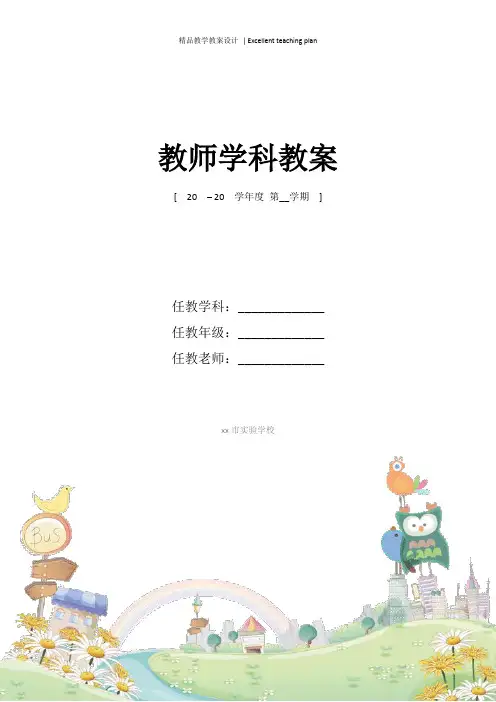
教师学科教案[ 20 – 20 学年度第__学期]任教学科:_____________任教年级:_____________任教老师:_____________xx市实验学校Unit 1 Section ⅢWord power 教学设计识记掌握自主预习根据首字母提示和英文解释写出下列单词1.f________:happening or existing before,but not now2.g________:to obtain a degree,especially a first degree,from a college or university 3.f________:able to speak a language very well4.d________:to give sth.(especially money) to a person or an organization to help others 5.k________:the quality of being kind6.s________:excellent or very fine7.i________:having their own government8.s________:in some way that you don't know or understand exactly9.r________:happening or starting a short time ago10.i________:officially to tell someone something or give them information about something答案:1.former 2.graduate 3.fluent 4.donate 5.kindness 6.splendid7.independent rm理解拓展名师解析1.former adj.以前的(一)背诵佳句培养语感(教材原句)Former student returns from China以前的学生从中国归来(鲜活例句)George Bush is the former president of the USA.乔治·布什是美国的前任总统。
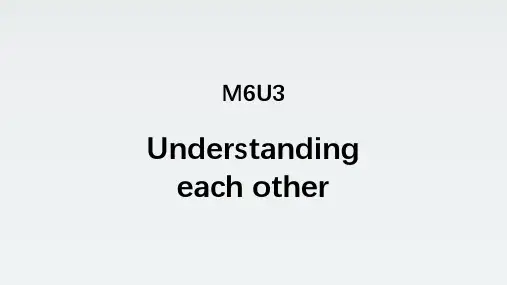
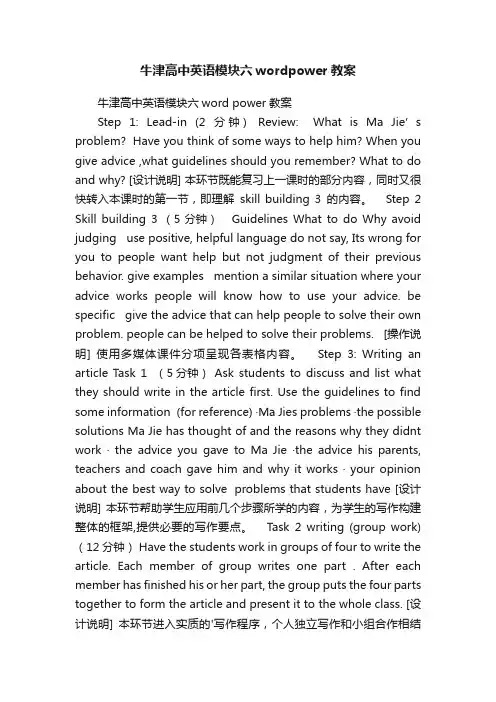
牛津高中英语模块六wordpower教案牛津高中英语模块六word power 教案Step 1: Lead-in (2分钟) Review: What is Ma Jie’s problem? Have you think of some ways to help him? When you give advice ,what guidelines should you remember? What to do and why? [设计说明] 本环节既能复习上一课时的部分内容,同时又很快转入本课时的第一节,即理解skill building 3的内容。
Step 2 Skill building 3 (5分钟)Guidelines What to do Why avoid judging use positive, helpful language do not say, Its wrong for you to people want help but not judgment of their previous behavior. give examples mention a similar situation where your advice works people will know how to use your advice. be specific give the advice that can help people to solve their own problem. people can be helped to solve their problems. [操作说明] 使用多媒体课件分项呈现各表格内容。
Step 3: Writing an article Task 1 (5分钟)Ask students to discuss and list what they should write in the article first. Use the guidelines to find some information (for reference) ·Ma Jies problems ·the possible solutions Ma Jie has thought of and the reasons why they didnt work · the advice you gave to Ma Jie ·the advice his parents, teachers and coach gave him and why it works · your opinion about the best way to solve problems that students have [设计说明] 本环节帮助学生应用前几个步骤所学的内容,为学生的写作构建整体的框架,提供必要的写作要点。
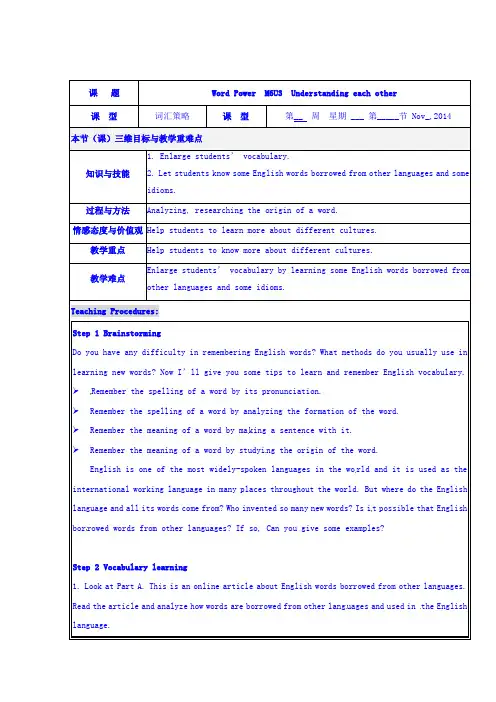
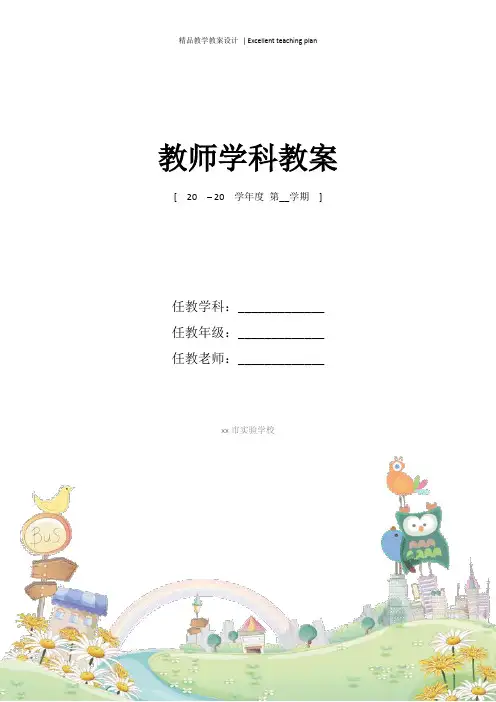
教师学科教案[ 20 – 20 学年度第__学期]任教学科:_____________任教年级:_____________任教老师:_____________xx市实验学校Teaching PlanM6U3 Understanding each otherWord powerEnglish words borrowed from other languagesM6U3 Understanding each otherWord power English words borrowed from other languages Teaching aims:1.Guide students to learn about some borrowed words and idioms in English andtheir meanings, origins, cultural backgrounds.2.Help students to improve the skills of judging, guessing and using borrowedwords and idioms. .3.Motivate students to understand the diversification of culture and raise theirawareness of sharing culture.Teaching procedures:Step 1: Lead in1.Play the English song Jingle Bell and ask——which festival is the song about?2.Let students compare Christmas Day with the Spring Festival (both the new year’sday), point out the cultural difference.3.Ask students: Why are we Chinese celebrating Christmas? ——Culture can beshared, so can language.4.Show students two borrowed words from French and Italian, and direct them toknow about their cultural background briefly.[Explanation]从学生最期盼的圣诞节入题,使学生带着情感和快乐讯速进入课堂情境。
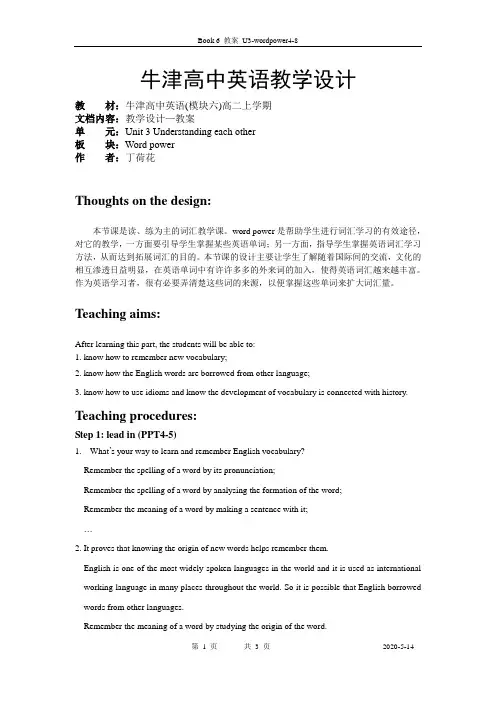
牛津高中英语教学设计教材:牛津高中英语(模块六)高二上学期文档内容:教学设计—教案单元:Unit 3 Understanding each other板块:Word power作者:丁荷花Thoughts on the design:本节课是读、练为主的词汇教学课。
word power是帮助学生进行词汇学习的有效途径,对它的教学,一方面要引导学生掌握某些英语单词;另一方面,指导学生掌握英语词汇学习方法,从而达到拓展词汇的目的。
本节课的设计主要让学生了解随着国际间的交流,文化的相互渗透日益明显,在英语单词中有许许多多的外来词的加入,使得英语词汇越来越丰富。
作为英语学习者,很有必要弄清楚这些词的来源,以便掌握这些单词来扩大词汇量。
Teaching aims:After learning this part, the students will be able to:1. know how to remember new vocabulary;2. know how the English words are borrowed from other language;3. know how to use idioms and know the development of vocabulary is connected with history. Teaching procedures:Step 1: lead in (PPT4-5)1.What’s your way to learn and remember English vocabulary?Remember the spelling of a word by its pronunciation;Remember the spelling of a word by analysing the formation of the word;Remember the meaning of a word by making a sentence with it;…2. It proves that knowing the origin of new words helps remember them.English is one of the most widely-spoken languages in the world and it is used as international working language in many places throughout the world. So it is possible that English borrowed words from other languages.Remember the meaning of a word by studying the origin of the word.[Explanation]通过如何记忆新单词导入新课,让学生讨论他们是如何记忆单词的,然后再引导他们要科学记忆单词,会有事半功倍的效果;最后再引到本课的主题通过了解一些单词的来源来记忆单词。
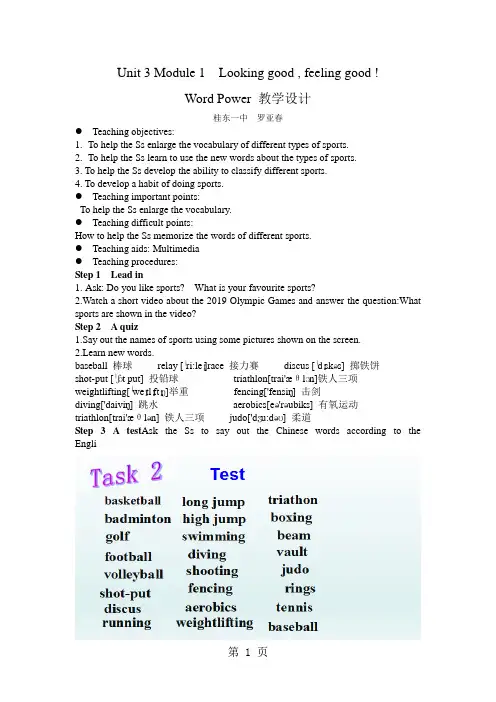
Unit 3 Module 1 Looking good , feeling good !Word Power 教学设计桂东一中罗亚春●Teaching objectives:1.To help the Ss enlarge the vocabulary of different types of sports.2.To help the Ss learn to use the new words about the types of sports.3. To help the Ss develop the ability to classify different sports.4. To develop a habit of doing sports.●Teaching important points:To help the Ss enlarge the vocabulary.●Teaching difficult points:How to help the Ss memorize the words of different sports.●Teaching aids: Multimedia●Teaching procedures:Step 1 Lead in1.Ask: Do you like sports? What is your favourite sports?2.Watch a short video about the 2019 Olympic Games and answer the question:What sports are shown in the video?Step 2 A quiz1.Say out the names of sports using some pictures shown on the screen.2.Learn new words.baseball 棒球relay [ˈri:leɪ]race 接力赛discus [ˈdɪskəs] 掷铁饼shot-put [ˈʃɔt put] 投铅球triathlon[trai'æθlɔn]铁人三项weightlifting[ˈweɪtlɪftɪŋ]举重fencing['fensiŋ] 击剑diving['daiviŋ] 跳水aerobics[eə'rəubiks] 有氧运动triathlon[trai'æθlən] 铁人三项judo['dʒu:dəʊ] 柔道Step 3 A test Ask the Ss to say out the Chinese words according to the EngliStep 4 Classify the sports into different types.1.Ball games:2.Track and field:3.Gymnastics:4.Water sports:5.Other sports:Step 5 Playing a game--- Guess what sport the student is performing.Step 6 Discussion1.How would you choose the sports to build up your strength? What kind of sports will you choose if you....●want to have fun with some of your friends ?●want to have some fun and exercise with only one of your friends?●want to do sports on your own?2.What can we benefit from sports?(List as many benefits as possible)(healthy body ,happy mood, cool figure,high spirits,good appetite, good friends ... ...) Step 7 ConclusionStep 8 Homework1.Finish Part C on Page 47.2.Try to find out and memorize more words about sports.3. Write about your favourite sports and the benefits it brings you.。
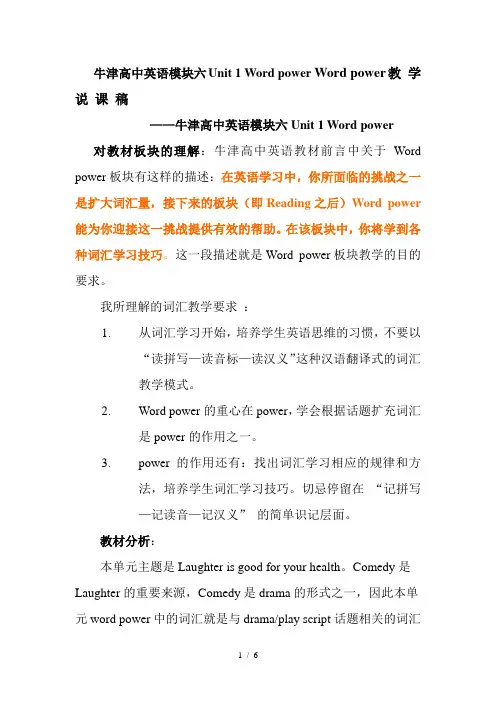
牛津高中英语模块六Unit 1 Word power Word power教学说课稿——牛津高中英语模块六Unit 1 Word power 对教材板块的理解:牛津高中英语教材前言中关于Word power板块有这样的描述:在英语学习中,你所面临的挑战之一是扩大词汇量,接下来的板块(即Reading之后)Word power 能为你迎接这一挑战提供有效的帮助。
在该板块中,你将学到各种词汇学习技巧。
这一段描述就是Word power板块教学的目的要求。
我所理解的词汇教学要求:1.从词汇学习开始,培养学生英语思维的习惯,不要以“读拼写—读音标—读汉义”这种汉语翻译式的词汇教学模式。
2.Word power的重心在power,学会根据话题扩充词汇是power的作用之一。
3.power的作用还有:找出词汇学习相应的规律和方法,培养学生词汇学习技巧。
切忌停留在“记拼写—记读音—记汉义”的简单识记层面。
教材分析:本单元主题是Laughter is good for your health。
Comedy是Laughter的重要来源,Comedy是drama的形式之一,因此本单元word power中的词汇就是与drama/play script话题相关的词汇扩充。
本单元的word power可以分为三类:1、与表演有关的剧本(含剧本、台词等词汇)2、表演环境(含舞台布置方面的词汇)3、演职人员及其要求教学目标:知识目标:通过本堂课学习,扩充关于performing的词汇相关的词汇。
能力目标:学会用mind-mapping和word tree的方式来记忆词汇,自己学做一个word tree。
情感目标:了解与表演有关的词汇,培养表演的兴趣?联系保卫钓鱼岛进行爱国主义教育。
教学重难点:理解和掌握本单元的新词汇cast ,prop,costume,script,microphone;突破act,cast,curtain,wing,scenery 等词汇在表演的专业术语中的词义理解。
江苏省新沂市第二中学高中英语《Unit 1 Word power》教案新人教版选修6教学方针1)To understand the text better2)To master some useful words and expressions重点 1.To understand the text better 难点1.To master some useful words and expressions教法及教具Talking, Practicing教学过程教学内容个案调整教师主导活动学生主体活动Step 1 Word studyRead the passage on Page 6, Part A. Pay attention to thewords in blue, guessing the meanings of them.1. To kill or not to kill, that is the question.Do you know the names of the cast and the line in thesescenes(场景)?the words thatthe actors say.2. Uncle Li is very angry; the consequence is very serious.lines & stage direction Zhang Yimou张艺谋A famous director(paper in hand)a person in charge of the whole performanceCast (全体演员)Director (导演)Lines (台词)Script (剧本)stage direction (舞台说明)Act (幕)Scene (场)one-act play (独幕剧)Step2 Word playMatch the words with the explanationA: areas to the right and left of stage which the audience can’t see.B: screen that can be raised or lowered at the front of a stage.C: platform of place on which plays are performed.D: things used on a theatre stage t o represent the place of action.E: special style of dress for a particular activity.1.scenery_______2.stage__________3.curtains_______4.costume________5.wings _______Step 3 Word competition1.What do we call the person who acts in a play?2.What do we call the person who is in charge of a play?3.What is a script made up of?4. What will an actor read in a script?5. What kind of play is called one-a ct plays?6.a part of a play in which the action happens in one place7.a small object used by actors during the performance ofa play or film8.the area at either side of the stage that can no t be seen by the audience9.the clothes worn by actors in a play, or worn by somebody to make them look like something else.Practice1.On hearing the gunshot, the birds flew in all d______.2. Do you think your w___ are strong enough to fly by yourself?3. People living in the countryside can enjoy wonderful natural s_____.4. Please read the s___ of the play first and try to keep the lines in mind.5. Act1, S_____2 of ‘Hamlet’ is exciting.S tep 4 DiscussionRead part C, and discuss how to be a good actor.How to be a good actor ?1. listen to the director2. learn lines by heart3. find out when the character he or she is playing onstage4. dress in his or her costume and wait in the wings intime5.know the props that are going to be usedbefore going on stage6. calm down and be confident when on stageStep 5 Idioms about smiling& laughingto laug h one’s head off: to laugh very hardto smile on someone: someone is luckyall smiles: becoming happy again especially after feelingsad.to have the last laugh:to make someone who hascriticized or defeated you look stupid by s ucceeding insomething more important or by seeing them failStep 6 Homework1.Find more idioms about smiling and laughing, and finishPart D.2. Make up a short play and try to act it out in class.板书设计教学札记。
Unit 3 word power 教学设计achieving aims:1. Enlarge students’ vocabulary2. Let students know some English words borrowed from other languages and some idioms.3. Learn about some different cultures.Teaching proceduresStep1. Lead inIntroduce some background knowledge about English language.Step 2. Presentation of borrowed language1. Learn some borrowed English words from other languages,Such as French, German, Italian, Arabic, etc.2. Show more words borrowed from other languages, such as Chinese, Japanese, etc. Step3. PracticeFinish Part C on page 39.Step 4. Presentation of idioms1. Learn the English idioms via pictures and example sentences.2. learn more idioms.Step 5. Assignment1. Everything if Albert hadn’t called the f ire brigade.A. will be destroyedB. will have been destroyedC. would be destroyedD. would have been destroyed2. The business is risky. But , we would be rich.A. should we succeedB. we should succeedC. might we succeedD. would we succeed3. What would have happened, ________, as far as the river bank?A. Bob had walked fartherB. if Bob should walk fartherC. had Bob walked fartherD. if Bob walked farther4. I _____ you some money, but I hadn’t any on me then.A. would lendB. would have lentC. could lendD. may have lent5. ______ today, he would get there by Friday.A. Was he leavingB. if he leavesC. Were he to leaveD. if he is leaving6. Supposing this ship ,do you think there would be enough life jackets for all the passengers?A. were to sinkB. has sunkC. was sinkingD. sunk7. I don’t think he’ll attend the party, and ______ he attend it, what would he wear?A. wereB. hadC. didD. should8. —— My boss often made me work day and night.—— If I _____ you, I ______ the job.A. am, will give upB. had been, would have given upC. were, would give upD. had been, would give up9. —— You can ask your brother for help.——He isn’t at home. If he _____, I ______.A. were, wouldB. is, wouldC. is, willD. were, will10. —— Are you thinking about going to Dalian for the vacation?—— No, but if I ________ time, I _________ very glad to go there.A. have, will beB. had had, would have beenC. had, would beD. had had, would be11. ——Sally finally got here from Chicago.—— If she_______ earlier, we ______ her to the party then.A. came, would takeB. had come, would have takenC. comes, will takeD. had come, would take12. if you_____ George, would you please tell him to ring me?A. sawB. were to seeC. had seenD. seeStep 6 ; HomeworkFinish Parts C1 and C2 on page118 in workbook。
牛津高中英语教学设计单元:Unit 3 The meaning of colour板块:Word powerThoughts on the design:本课件是以听、说、读为主的词汇教学课。
按照学生的认知规律,从温故知新——探索新知识——使用新知识——巩固新知识进行教学;针对词汇教学的特点,设计竟猜等一系列的课堂活动,鼓励学生参与,形成师生互动,以便更好地掌握本节课与国花有关联的单词和与颜色有关联的短语。
Teaching aims:After learning the word power, Ss will be able to know some words related to national flowers and some expressions related to colour idioms.Teaching procedures:Step 1 Revision1. Competition.Guess different names of the countries according to the national flags given. (PPT 5-6)2. Ask Ss to discuss the question:What kind of things can represent a country? (PPT 7-10)National flags, national flowers, national emblem, national anthem[Explanation]本课的教学从复习入手,让学生了解一些国家的国旗。
通过看国旗猜国家名称的竞赛活动,充分调动学生的学习热情和兴趣,寓教于乐。
然后通过回答问题What kind of things can represent a country? 导入到National flowers。
Step 2 Read and understandAsk Ss to read the article about national flowers for different countries in Part A.1. Ask Ss to find out which flowers are mentioned in the article as national symbols for different countries and give a brief description of each. (PPT 11-12)2. Encourage Ss to fill in the table. (PPT13-15)[Explanation]通过阅读第38页的文本, 让学生找出文中所介绍的几种国花,并对它们进行描述。
牛津高中英语教学设计
教材:牛津高中英语(模块六)高二上学期
文档内容:教学设计—教案
单元:Unit 1 Laughter is good for you
板块:Word power
作者:刘青
Thoughts on the design:
本节课是与本单元主题相关的词汇课,分别涉及到与戏剧相关的分类词汇和与单元主题“Laughter”相关的习语,目的在于拓展学生对与话题相关的词语的认识和运用,而且为本单元的Project教学的展开做好铺垫。
本课将教材的内容略作调整,便于教师操作。
Teaching aims:
After this class, the students will be able to
1.know more about the idioms about smiling and laughing;
2.know more about the vocabulary about drama and performing;
3.know something about what they should take into consideration if they want
put on a drama.
Teaching procedures:
Step 1 lead in (PPT4-8)
1.In the last two periods we have talked about laughter and things which can bring us laughter.
Actually laughter is full of our life. We even have lot of idioms in English about smiling and laughing. (PPT4)
2.Page 7 Part D
Ask the Ss to read to explanations and the example sentences and make sure they have got the meanings of two idioms.(PPT5)
3.Ask the Ss if they know any other idioms about smiling and laughing. If so, ask them to give
examples. If not, give them two more. Give them example sentences first and allow them the chance to guess the meanings. Then give the exact explanations.(PPT6-7)
4.Ask them to find more idioms about smiling and laughter after class.(PPT8)[Explanation]
因为Part D涉及到有关于“smiling”和“laughing”的习语,正好和单元主题相吻合,教师可以顺延前两节课的话题,继续将Laughter,不突兀。
因此将Parts D 提前作为导入,也作为新课的一个环节,起到承上启下的作用。
Step 2 Part A & Part B (PPT 9-12)
1.Many things in our life can bring us laughter and actually we can also do something to
amuse others and ourselves, for example, we can put on performances or a drama. How much do you know about drama and what should you prepare if you want to put on a drama? Now, can you answer these questions? (PPT9-11)
(1)What are all the actors in a play called?
(2)What do we call the person who acts in a play?
(3) What do we call the person who is in charge of a play?
(4) What will an actor read in a script?
(5) What are acts and scenes in a play?
(6) What kind of play is called one-act plays?
See how many questions the Ss can answer, then ask them to read Part A and get all the answers.
Keys: (1) The cast (2) An actor or an actress (3) The director
(4) Lines and stage direction
(5)Acts are like chapters in a book and are made up of different scenes.
Scenes are like paragraphs in a chapter.
(6) Very short plays in which all the action occurs at one time, in one place.
2. Look at Part B and make sure the Ss understand what each word means.(PPT12)[Explanation]
先提出问题,学生有些能回答有些不能,他们的求知欲望会被激发,然后在阅读Part A效果会更好。
Part B结合图画学生能较快的得到各个词汇的具体含义,因此不需要过多的花精力。
Step 3 Part C Application(PPT13)
Ask the Ss to finish Part C using the words mentioned above.
[Explanation]
这一部分根据教材的编排,让学生将所了解的词汇进行运用。
Step 4 Discussion(PPT14)
What should we consider if we want to put on a drama?The Ss may come up with “cast”, “script” and “stage”, remind them that they may have to consider some other things, like “budget”, “costumes” and so on.
[Explanation]
本部分是作为一个总结,考查学生是否真正理解了本课所涉及的词汇,并能进行正确分类。
以讨论的形式给学生提供交流的机会,可以在小组内进行信息交流和相互补充。
此外,这一部分的设计让学生对要筹备戏剧的演出该做哪些准备有一定的思考,为Project的教学做好铺垫。
Step 5 Homework (PPT15)
1. Find more idioms about smiling and laughing;
2. Review all the expressions related to drama and performing.
[Explanation]
家庭作业的布置是课堂的延伸,对课堂教学的内容的巩固。